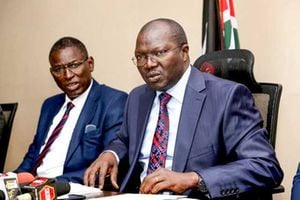Moyale man, 95, gets ID for first time, offering hope to others
Mzee Somo Ali, 95, who was among the first Kenyans who served in the King African Rifle (KAR) and who lowered the Black Jack when Kenya attained independence. He was unable to obtain a national identity card until two weeks ago due to bureaucracies and discrimination of his Sakuye community.
A 95-year-old man who hoisted the Kenyan flag at independence as the Union Jack was lowered was among Marsabit residents who received their national identification cards recently as the government hastens the process in the border county.
Mzee Somo Ali, from Dabel division, obtained his ID two weeks ago.
Speaking to Nation.Africa in his office, Moyale Deputy County Commissioner Stanley Too said the government had decided to expedite the issuing of IDs to residents to ease a backlog worsened by the Covid-19 pandemic.
He said issuing IDs to deserving citizens should be a “matter of right and not the obligation of the said citizen to pursue it”.
“We have put in place all the necessary strategies to ensure that all eligible Moyale residents acquired IDs as fast as possible,” Mr Too said.
More than 200 IDs will be issued to locals every two months, he said. In previous years, the government issued that number of IDs in about six months.
The administrator said the government had looked at challenges locals face in acquiring IDs and the prohibitive conditions in the border region and eased the process.
The State also looked at alleged discrimination in the issuing of ID cards and made administrative changes to improve registration.
As a result, the Sakuye community that lives on the Marsabit-Wajir border were given priority in the ongoing process following claims that most of the community’s members had not received IDs since independence.

Mzee Abdi Boya, an elder, speaking to the Nation at Dabel dispensary on August 24, 2022. He decried discrimination of the Sakuye community during national ID issuance.
Mr Too said nearly 150 members of the Sakuye community had no national IDs.
But 15 of them received the documents recently.
Grassroots committees had been established right from the sub-location to help vet persons who were yet to obtain IDs.
Mr Too explained that the committees provide accountability and redress for residents whose right to an ID was violated.
In September, Nation.Africa learned during a visit to Dabel division in Moyale sub-county that a substantial number of complaints had been lodged about discrimination in the issuing of national ID cards.
Dabel residents decried being denied IDs when some foreigners bribed officials to get the documents.
Resident Ibrahim Ali Abdullahi lamented that there were great and unnecessary delays in the registration process, and many residents, especially in the Sakuye community, were denied IDs and thus the right to vote.
A majority of Sakuye youths who are educated are jobless and some above 35 years old are unable to obtain national identification cards due to what they called discrimination at the registration office in Moyale.

Moyale deputy County Commissioner Stanley Too during an interview in his office on October 19, 2022. He said measures were in place to ensure all eligible Moyale residents obtained national IDs.
“We’re concerned about how the Sakuye community in Dabel has been compelled to undergo years of neglect and rendered helplessly voiceless even amid humanitarian crises. Even to date some of our members who have clocked the 80s and 90s are yet to obtain national IDs,” Mzee Ali said.
An ID card is often used to prove citizenship in Kenya and people who don’t have it cannot enjoy the rights of citizens such as voting.
Moyale residents who have no IDs have limited freedom of movement, especially while travelling on the Moyale-Isiolo highway.
Most of them are harassed by police when they fail to produce an identity card.
Their freedom of movement is also curtailed because one requires a national ID to obtain a passport and other necessary travel documents.
Their right to buy property or transfer it to others or to engage in normal business transactions, such as opening a bank account, is also limited.





